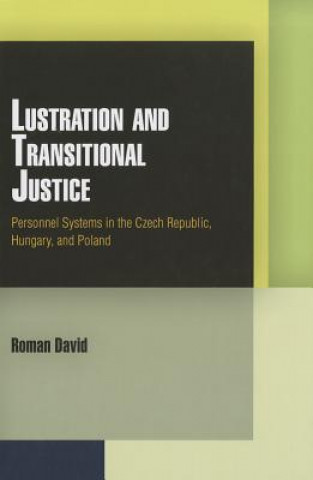
Kód: 04724321
Lustration and Transitional Justice
Autor Roman David
How do transitional democracies deal with officials who have been tainted by complicity with prior governments? Should they be excluded or should they be incorporated into the new system? In Lustration and Transitional Justice, Ro ... celý popis
- Jazyk:
 Angličtina
Angličtina - Vazba: Pevná
- Počet stran: 328
Nakladatelství: University of Pennsylvania Press, 2011
- Více informací o knize

2972 Kč
Dostupnost:
50 % šance Máme informaci, že by titul mohl být dostupný. Na základě vaší objednávky se ho pokusíme do 6 týdnů zajistit.
Máme informaci, že by titul mohl být dostupný. Na základě vaší objednávky se ho pokusíme do 6 týdnů zajistit.Prohledáme celý svět
Mohlo by se vám také líbit
-

Dune
216 Kč -

Haunting Adeline
621 Kč -

Berserk Deluxe Volume 2
1092 Kč -

White Nights
89 Kč -

Powerless
268 Kč -

Atomic Habits
330 Kč -

Dune Messiah
228 Kč -

Berserk Deluxe Volume 3
1142 Kč -

One Day
221 Kč -

Berserk Deluxe Volume 1
1115 Kč -

Iron Flame
368 Kč -

Surrounded by Idiots
213 Kč -

Harry Potter and the Prisoner of Azkaban (Minalima Edition)
993 Kč -

Gravity Falls Journal 3
443 Kč -

Heaven Official's Blessing: Tian Guan Ci Fu (Novel) Vol. 1
420 Kč -

The Creative Act
568 Kč -

Dune
276 Kč -

Hunting Adeline
624 Kč -

A Little Life
290 Kč -

Children of Dune
230 Kč -

Heaven Official's Blessing: Tian Guan Ci Fu (Novel) Vol. 2
427 Kč
Darujte tuto knihu ještě dnes
- Objednejte knihu a zvolte Zaslat jako dárek.
- Obratem obdržíte darovací poukaz na knihu, který můžete ihned předat obdarovanému.
- Knihu zašleme na adresu obdarovaného, o nic se nestaráte.
Informovat o naskladnění knihy
Zadejte do formuláře e-mailovou adresu a jakmile knihu naskladníme, zašleme vám o tom zprávu. Pohlídáme vše za vás.
Více informací o knize Lustration and Transitional Justice
Nákupem získáte 297 bodů
 Anotace knihy
Anotace knihy
How do transitional democracies deal with officials who have been tainted by complicity with prior governments? Should they be excluded or should they be incorporated into the new system? In Lustration and Transitional Justice, Roman David examines major institutional innovations that developed in Central Europe following the collapse of communist regimes. While the Czech Republic approved a lustration (vetting) law based on the traditional method of dismissals, Hungary and Poland devised alternative models that granted their tainted officials a second chance in exchange for truth. David classifies personnel systems as exclusive, inclusive, and reconciliatory; they are based on dismissal, exposure, and confession, respectively, and they represent three major classes of transitional justice. David argues that in addition to their immediate purposes, personnel systems carry symbolic meanings that help explain their origin and shape their effects. In their effort to purify public life, personnel systems send different ideological messages that affect trust in government and the social standing of former adversaries. Exclusive systems may establish trust at the expense of reconciliation, while inclusive and reconciliatory systems may promote both trust and reconciliation. In spite of its importance, the topic of inherited personnel has received only limited attention in research on transitional justice and democratization. Lustration and Transitional Justice is the first attempt to fill this gap. Combining insights from cultural sociology and political psychology with the analysis of original experiments, historical surveys, parliamentary debates, and interviews, the book shows how perceptions of tainted personnel affected the origin of lustration systems and how dismissal, exposure, and confession affected trust in government, reconciliation, and collective memory.
 Parametry knihy
Parametry knihy
Zařazení knihy Knihy v angličtině Society & social sciences Politics & government Political control & freedoms
2972 Kč
- Plný název: Lustration and Transitional Justice
- Autor: Roman David
- Jazyk:
 Angličtina
Angličtina - Vazba: Pevná
- Počet stran: 328
- EAN: 9780812243314
- ISBN: 0812243315
- ID: 04724321
- Nakladatelství: University of Pennsylvania Press
- Hmotnost: 622 g
- Rozměry: 162 × 269 × 30 mm
- Datum vydání: 01. August 2011
Osobní odběr Praha, Brno a 12903 dalších
Copyright ©2008-24 nejlevnejsi-knihy.cz Všechna práva vyhrazenaSoukromíCookies


 Vrácení do měsíce
Vrácení do měsíce 571 999 099 (8-15.30h)
571 999 099 (8-15.30h)